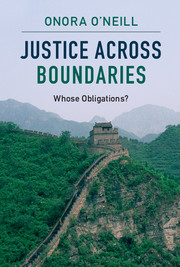Book contents
- Frontmatter
- Contents
- Acknowledgements
- Introduction
- Part I HUNGER ACROSS BOUNDARIES
- Part II JUSTIFICATIONS ACROSS BOUNDARIES
- Part III ACTION ACROSS BOUNDARIES
- 8 From Edmund Burke to twenty-first-century human rights: abstraction, circumstances and globalisation
- 9 From statist to global conceptions of justice
- 10 Global justice: whose obligations?
- 11 Agents of justice
- 12 The dark side of human rights
- Part IV HEALTH ACROSS BOUNDARIES
- Index
8 - From Edmund Burke to twenty-first-century human rights: abstraction, circumstances and globalisation
from Part III - ACTION ACROSS BOUNDARIES
Published online by Cambridge University Press: 05 February 2016
- Frontmatter
- Contents
- Acknowledgements
- Introduction
- Part I HUNGER ACROSS BOUNDARIES
- Part II JUSTIFICATIONS ACROSS BOUNDARIES
- Part III ACTION ACROSS BOUNDARIES
- 8 From Edmund Burke to twenty-first-century human rights: abstraction, circumstances and globalisation
- 9 From statist to global conceptions of justice
- 10 Global justice: whose obligations?
- 11 Agents of justice
- 12 The dark side of human rights
- Part IV HEALTH ACROSS BOUNDARIES
- Index
Summary
Edmund Burke on revolutions and rights
Critical comments on appeals to the rights of man played a central and memorable part in Edmund Burke's thought. What might he have thought about the human rights proclaimed in the Universal Declaration of Human Rights and other international documents, such as the European Convention of Human Rights, that have achieved global resonance in our times? Would he have reiterated his criticisms of the ‘abstract’ character of the supposed rights of man, and dismissed twentieth-century human rights and aspirations for their global reach as one more form of abstract and defective liberalism that fails to take account of the circumstances of particular times and situations? Or would he have concluded that contemporary commitments to ‘realise’ human rights save them from mere abstraction, and that it is feasible to embed them in our times and our communities?
Edmund Burke took a complex, sometimes surprising, view of the revolutionary movements of his day, and of their claims about rights. In many writings he celebrates natural rights and those constitutions that respect and further them; in others he excoriates what he calls ‘abstract’ rights, such as the rights of man of the French Revolution, and those who claim and pursue them. In the decades before he published Reflections on the Revolution in France he argued for conciliation with the American revolutionaries, wrote scathingly about the oppression of Catholics in Ireland and attacked the abuses of the East India Company. In each case he commented on the injustice of what was being done and on the need to protect the rights of the oppressed, and argued for reform. But in the 1790s he castigated the revolutionaries of France and their commitment to the Declaration of the Rights of Man and the Citizen of 1789. Across more than two centuries Burke's admirers and critics have repeatedly discussed this tension – some of them at considerable length. But they have reached no consensus.
Opinions were highly divided among Burke's contemporaries and near contemporaries. Coleridge claimed that nobody could doubt Mr Burke's consistency, and that any contrary impression arose because Burke argued from the same principles in differing circumstances, legitimately reaching differing conclusions.
- Type
- Chapter
- Information
- Justice across BoundariesWhose Obligations?, pp. 137 - 150Publisher: Cambridge University PressPrint publication year: 2016

